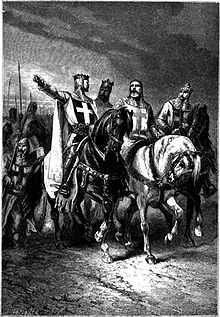Philippe de Nanteuil
| Philippe de Nanteuil | |
|---|---|
 | |
| Born | XIII |
| Died | 1258 |
| Nationality | France |
| Occupation | Crusader |
| Known for | battles and poetry |
Philippe de Nanteuil (Latin: Philippus de Nantolio), Italian: Filippo di Natoli), was a noble, a knight and a Troubadour. He inherited from the father Philippe I de Nanteuil (1155-1227 like Lord the castle of Nanteuil-le-Haudouin and the castle of Pomponne in France. He was famous as a trouvère and Crusader, and was the banker of king Louis IX of France.
His brother was Renaud de Nanteuil (* 1267 - † 27 settembre 1283) the Bishop of Beauvais.
Philippe de Nanteuil was a near friend of King Theobald I of Navarre or Theobald IV of Champagne and wrote for him severals poems. Philippe de Nanteuil and Theobald of Navarre used the poems dialog forms called Jeu parti[1].
In 1239 Philippe de Nanteuil joined and fought hard in the Crusade, and next the defeat in the Battle of Gaza on 13 November 1239 led by Theobald I, King of Navarre, he was imprisoned and became a slave to the Sultan of Egypt Al-Adil II. During his imprisonment in Cairo he wroted a number of songs to the praise of his native France, but also on the defeat in Gaza (En chantant veil mon duel faire), in which for him the Ritterorden was responsible of the defeat[2][3]. In the fall of 1240 he was removed from captivity. Next Philippe de Nanteuil become the family banker of the King Louis IX of France. The great chroniclers of medieval France, Jean de Joinville considered Philippe de Nanteuil with Thibaud de Marly, Geoffroy de Sergines and Humbert V de Beaujeu the ideal of Prud'homme knights[4].
He was married to Isabeau de Nesle de Nanteuil born in 1235 from the dynasty of the Dukes of Saxony, and had two sons:
- Thibaud V de Nesle or Thibaud de Nanteuil, also known as Thibaud de Bauvais (* 1283, † December 26, 1300), Lord of Nanteuil and Bishop of Beauvais.
- Alix de Nanteuil († 1303), Lady of Nanteuil; married with Pierre de Châtillon, Lord of Pacy-en-Valois.
Link
Bibliography
- Karl Bartsch, Adolf Horning, La Langue et la littérature françaises depuis le IXème siècle jusqu'au XIVème, Maisonneuve et Leclerc, Paris, 1887, page 385
- Hochspringen, Christoper Marshall: Warface in Latin East, 1192-1291, Cambridge University Press, 1994, p. 60
- Hochspringen, Les chansons de croisade, p. 222-223
- Hochspringen, Joinville, II, §7, Ethel Wedgwood, 1906
References
- ↑ Karl Bartsch, Adolf Horning: La Langue et la littérature françaises depuis le IXème siècle jusqu'au XIVème, Maisonneuve et Leclerc, Paris 1887, pgg. 385
- ↑ Christoper Marshall, Warfare in Latin East, 1192-1291, Cambridge University Press, 1994, page 60
- ↑ Les chansons de croisade, page 222-223
- ↑ Joinville, II, §7, Ethel Wedgwood (1906)